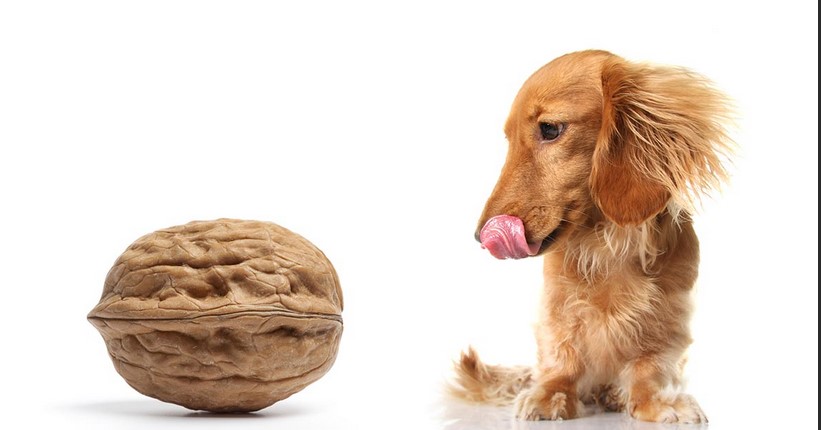Can Dogs Eat Walnuts?
Can dogs eat walnuts? If so, how much? What are the dangers? Is walnut consumption harmful to your pet? In this article, we’ll explore the dangers of walnuts in dogs, how to tell if your dog is allergic, and how much your dog can safely eat. Plus, we’ll cover Juglone and Mycotoxins – two substances found in moldy walnuts.
Can dogs eat walnuts? In some forms, yes! I had a friend suggest her dog was allergic to walnuts. After an allergy testing, it was found her pooch reacted to the Black Walnuts but not the English Walnuts. The dog is safe in chewing the shelled halves and low levels of juglone are not enough to cause an allergic reaction.

Can your dog ingest walnuts?
Though not super-toxic to dogs, walnuts can be dangerous to their health if consumed in large quantities. They contain a fungus called mycotoxin, which can be fatal to dogs. Black walnuts, which are common in Canada and the Northeastern US, are especially toxic. If your dog eats walnuts, you should call a veterinarian right away. Black walnuts can cause serious problems, such as vomiting and diarrhea, and may cause pancreatitis and gastroenteritis, which are painful and life-threatening.
Toxins in walnuts can cause gastrointestinal blockages in dogs, and they must be treated immediately. Cooking the nuts may remove them, but you still need to watch your dog’s intake and make sure it is safe for him. If your dog eats walnuts that are moldy, the toxins are much stronger and could cause a choking hazard. This is especially dangerous for small dogs, as their windpipes are smaller.
Juglone in walnuts
The chemicals juglone and hydrojuglone are present in high concentrations in walnuts. This compound is poorly soluble in water and does not move very fast through soil. Although it is found in all walnut species, black walnuts contain the most amount of juglone. The chemical is particularly toxic for dogs. English walnuts are not as toxic but have a high fat content and may cause damage to sensitive plants.
Walnuts are an excellent source of fiber, but a healthy diet is necessary for your dog to be healthy. A daily diet of walnuts should contain no more than two to three tablespoons. If your dog eats walnuts, it may develop symptoms of juglone and pancreatitis. It is important to note that some dogs tolerate walnut treats just fine. Other dogs may react to the fat and toxins that are present in walnuts.
Mycotoxins in moldy walnuts
Mycotoxins in moldy walnuts can cause serious side effects, including vomiting, tremors, and even seizures in humans. These symptoms may be difficult to identify until you or your dog consumes a large quantity of walnuts. If you suspect that you have ingested black walnuts, you should consult your veterinarian immediately. Ingestion of these nuts can cause a host of other health problems, including increased heart rates, elevated body temperatures, and lack of appetite.
Mycotoxins are fungal toxins that can damage your health. Although there are no immediate health consequences from eating moldy walnuts, chronic exposure to these chemicals can cause damage to your kidneys and liver. They can also change your DNA. The most dangerous type of mycotoxins is aflatoxins, and there are different kinds. The best way to avoid moldy nuts is to avoid using them in baking. If you do decide to eat them, just make sure you buy them organically grown.
Weight gain
Many articles have recommended that people avoid giving their dogs walnuts due to the high fat content, but the truth is, nuts are good for dogs in small amounts. Despite their name, they contain a high amount of fat and the average dog should consume no more than 14 grams of fat per day. Walnuts are also a choking hazard for dogs and can cause intestinal blockages. These blockages can be life threatening if left untreated.
Nuts are a great treat for humans, but are unhealthy for our canines. Large and small dogs alike may choke on walnuts. Inhaling nuts, particularly fatty ones, can result in a blocked airway, which is dangerous for dogs. So, it is essential to limit your dog’s walnut intake. You can also give your dog walnut pieces once a week, if you have a small dog.

Convulsions
If your dog eats walnuts, be sure to contact your veterinarian immediately to avoid further complications. A few walnuts can be toxic for dogs, so it is vital to keep your dog away from them. English and black walnuts are both safe to eat, but you must avoid the black variety as it contains juglone, a toxin that is toxic to dogs. English walnuts are less toxic than black walnuts, but they are still high in calories and fat. For this reason, English walnuts should be offered to your dog sparingly and never give your dog a whole walnut.
Walnuts contain a hard, pointy shell, which dogs should avoid eating. While most nuts have a soft, pliable shell, walnuts’ rigid shell can be difficult to digest and may puncture your dog’s stomach. Therefore, you should remove the shell and skin from walnuts before giving your dog any. This will protect your dog from any harmful effects. Also, make sure to use walnuts that are pre -shelled. If your dog eats walnuts that are shelled, the risk of fungal contamination is higher.
Obesity
Walnuts can be harmful to dogs. They can be a source of mycotoxins, which can cause seizures and convulsions. To prevent this, you should store walnuts in a dry area or freeze them before offering them to your dog. Additionally, walnuts can cause obesity in dogs due to their high fat content. This is why you should give them walnuts only sparingly and never serve them whole.
Walnuts have a hard, pointy shell. Most nuts don’t have a rigid shell, but walnuts’ shell is particularly hard and can puncture a dog’s stomach. So, if you want to give your dog walnuts, make sure to remove the shell and skin. This will ensure that your dog won’t be exposed to these dangerous toxins. If you do give your dog walnuts, make sure to wash them thoroughly afterward to get rid of any fungal growth.
Walnuts are safe for dogs, but are not recommended for them. They do contain high fats and calories that your dog does not need. If you want your dog to eat walnuts, cut them up into small pieces and make them into treats.
